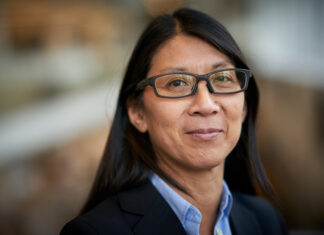Sigrid Nikutta has been a board member for freight transport at Deutsche Bahn for more than two years. In an interview, she talks about the career challenges women face and what tips she has.
Now in your early 50s and with a proven record of managing large corporations, it suddenly doesn’t seem to matter if you’re a woman or a man – does it really?
In fact, success counts and in the end, success is reported and celebrated – regardless of gender. However, there is always the, let’s say “surprise element” – a woman, several children, a seasoned company boss, demonstrably successful. This astonishment in the voice, in the reports, is revealing: this combination is not yet a matter of course in our culture. I am happy to be described as ‘petite, lively, super smart, loud’, even in what are actually serious economic reports. What are these descriptions for a manager? I would probably use that to describe my children. Here we can see how the stereotypes man/woman, manager/mother are still anchored in many minds.
And does that annoy you? How do you deal with that?
To annoy? That’s not my category in management. But I consciously take note of it and work to change the business world!
What is your advice to women who are at the beginning of their careers?
Advice is also a beating… But I’m happy to share my experiences! Don’t let it irritate you, just let it roll off, but always keep your own direction and your own compass. Setbacks are part of life. It’s about developing frustration tolerance – and it goes on! I know such good women. Each of them can have the career they want. It’s about believing exactly in it and working hard on it; and don’t let yourself be dissuaded from this path! And my personal message is: career and children – they go together perfectly!
Sigrid Nikutta is a board member for freight transport at Deutsche Bahn AG and at the same time chairwoman of the board of DB Cargo AG. Before that, she was CEO of Berliner Verkehrsbetriebe for almost ten years and led the company into the black for the first time. From 1996 to 2010 she held various management positions at Deutsche Bahn.
The car industry and the railway industry are still male domains. It took 185 years for you to become the first woman to take over rail freight transport. When it comes to women in the top jobs, do we really have to count in centuries?
The first train journey with the legendary Adler steam locomotive took place in 1835 from Nuremberg to Fürth – and that was really the first freight train, because beer kegs were also transported. I am optimistic and realistic about the future. Realistic in that gender will always matter. Optimistic because women are increasingly getting the same opportunities. And in the years when we have some catching up to do, I also think it’s good if being a woman – after all the centuries of discrimination – becomes an advantage.
It is well known that female pioneers always have the hardest time. You are such a pioneer in technology. What motivates you?
The term ‘challenge’ has positive connotations for me. Difficult management tasks with a high level of complexity are my thing. I get a lot of strength and vigor from that.
Is there a ritual from which you draw strength?
The alarm clock rings, I jump up and off we go. Start immediately, don’t wait – that’s my morning ritual.
What was the worst advice you’ve ever received?
As a child: Act like a girl and everyone will like you. I think many women received this advice – and it still leads many women to believe that assertiveness and clear positions are more masculine.
And what was the best advice?
There were many, but better than advice is the example! And I had a lot of great leaders – women and men – from whom I could learn and learn. My grandmother always emphasized: The only thing you can always rely on in life and will always remain is what you have in your head. Unfortunately, this piece of advice is more relevant than ever, especially in times of war in Europe.
The Mission Female business network, founded by Frederike Probert, is actively committed to more female power in business, society, media, culture, sports and politics. It unites successful women across all industries with the aim of making further professional progress together.
















































